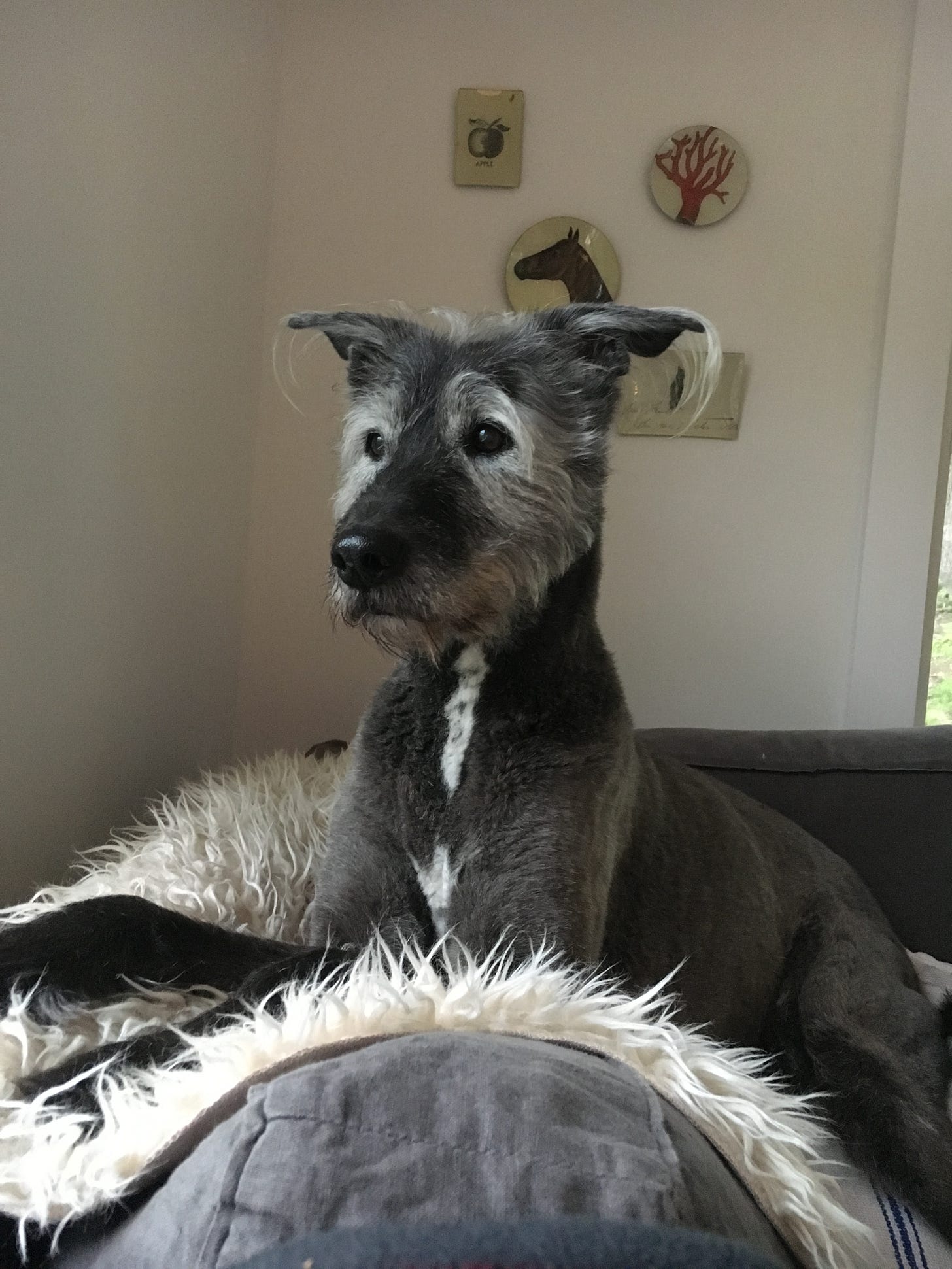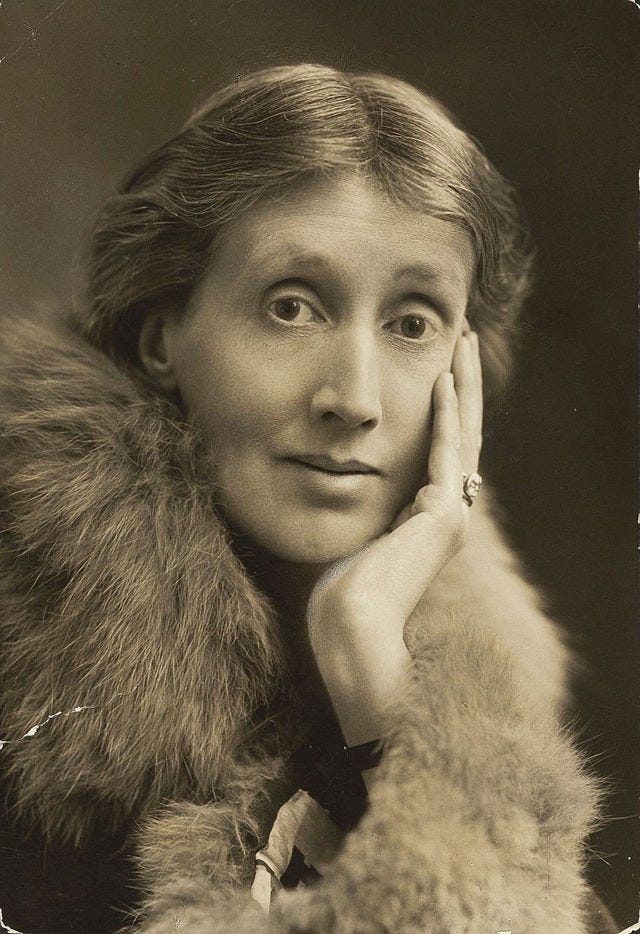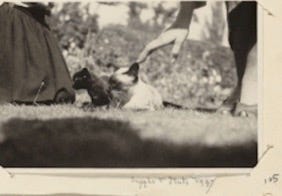Dear Reader,
Here we are with another Sunday edition. I’m wrapping up a big project just now, and we should be back to our regularly scheduled Saturday releases as of next week.
This issue is dedicated to Olive, who was the best dog. While she now rests in power, gamboling with her signature ground-covering stride on the other side of the rainbow bridge, she was in life a true queen of love and light. Her ear wisps, so silky and so shapely, remain the stuff of legend in the annals of canine pulchritude.
No matter where her mom Lisa went, Olive went with. And no matter what Lisa’s trials and travails entailed, Olive abided, comforted, enlivened. When I worried about Lisa, I was reassured to know that she had not only the best human partner, but also the best dog. For any of you who have experienced the gift of a “best dog,” this one’s for you.
Review
Flush: A Biography
Virginia Woolf
Harvest Press, 1976
204 pages
$19.95
It started with a simple request last week on Twitter.

I read so much about environmental degradation that I have to make sure I also read more broadly about the non-human world. And frankly, sometimes a girl could also use a little cheering up. A sincere tip of the charioteer’s helmet to the critic Ryan Ruby (read Ryan’s work if you want TheGoodStuff™) for suggesting Flush (1933), by Virginia Woolf. I suppose that I’d known vaguely about this book. Something about a dog? Something about a joke?
How I wish my mother were alive, so that I could ask her about Flush. She was a Woolf completist and Bloomsbury obsessive. She read everything that came out: biographies, letters, exhibition catalogues. In the late Eighties, she recommended that I read Lytton Strachey’s Eminent Victorians (1918). It blew my mind. Until then, I hadn’t known that one could write biography with the express purpose of skewering the subjects. Strachey’s takedown of Cardinal Manning is an absolute classic:
Was there something in it [the 19th century], scientific and progressive as it was, which went out to welcome the representative of ancient tradition and uncompromising faith? Had it, perhaps, a place in its heart for such as Manning—a soft place, one might almost say? Or, on the other hand, was it he who had been supple and yielding? He who had won by art what he would never have won by force, and who had managed, so to speak, to be one of the leaders of the procession less through merit than through a superior faculty for gliding adroitly to the front rank?
Whew! As I re-read parts of Eminent Victorians this week, it was clear that Virginia Woolf was certainly influenced by the older Strachey’s somewhat arch and knowing prose style, as well as his highly skeptical view of British society. The only positive portrait in his book is that of Florence Nightingale, whose life serves as Strachey’s vehicle for his bitter criticism of a bellicose British empire, and the War Office in particular.
Woolf wrote Flush as a bit of a lark (and, yes, a bit of a takeoff on Eminent Victorians), after she had produced The Waves (1931), a monument of experimental modernism. She had been reading up on the life of the Victorian poet Elizabeth Barrett Browning (1806-1861), and she’d become enchanted by the story of Browning’s cocker spaniel Flush. Strachey had sketched Nightingale, who had nursed so many soldiers. Woolf decided to sketch her own eminent Victorian, namely the dog who had nursed the great poet back to health.
In the year 1840, Barrett was as yet unmarried. Already in poor health for some time, she was now bedridden with anguish following the untimely deaths of two of her brothers.
It was at this dark moment that Mary Russell Mitford, Browning’s literary mentor and dear friend, arrived from the country and gave the poet her beloved spaniel Flush. When I share with you this single sentence from the moment at which Mitford has rung the bell at the Barretts’ house, you will get a sense of the masses of fun Virginia Woolf must have had in writing this book.
Indeed, when when the world seems tumbling to ruin, and civilisation rocks on its foundations, one has only to go to Wimpole Street; to pace that avenue; to survey those houses; to consider their uniformity; to marvel at the window curtains and their consistency; to admire the brass knockers and their regularity; to observe butchers tendering joints and cooks receiving them; to reckon the incomes of their inhabitants and infer their consequent submission to the laws of God and man—one has only to go to Wimpole Street and drink deep of the peace breathed by authority in order to heave a sigh of thankfulness that, while Corinth has fallen and Messina has tumbled, while crowns have blown down the wind and old Empires have gone up in flames, Wimpole Street has remained unmoved and, turning from Wimple Street into Oxford Street, a prayer rises in the heart and bursts from the lips that not a brick of Wimpole Street may be re-pointed, not a curtain washed, not a butcher fail to tender or a cook to receive the sirloin, the haunch, the breast, the ribs of mutton and beef for ever and ever, for as long as Wimpole Street remains, civilisation is secure.
Whew! Those semi-colons. That em dash. The mock-heroic prayerful arrogance. The lavish irony at the climax about all those cuts of meat that are “civilized” to eat—while butchering a spaniel in the same way, for example, would be taboo. What you need to know is that this is but one from an essentially uninterrupted stream of astonishing sentences. It’s all pure Woolf, and to anyone who says this book is some sort of step-child to her oeuvre, I say: fight me. Indeed, here’s what we get next:
The butlers of Wimpole street move ponderously even today; in the summer of 1842 they were more deliberate still.
So good. The portrait of Wimpole Street (and by extension, elite British society) from the human point of view serves as a natural and profound contrast to the impressions of our canine hero, as he trots across the threshold of his new home for the first time.
. . . [Flush] was more astonished by what he smelt than by what he saw. Up the funnel of the staircase came warm whiffs of joints roasting, of fowls basting, of soups simmering—ravishing almost as food itself to nostrils used to the meagre savour of Kerenhappock’s penurious frys and hashes. Mixing with the smell of food were further smells—smells of cedarwood and sandalwood and mahogany; scents of male bodies and female bodies; of men servants and maid servants; of coats and trousers; of crinolines and mantles; of curtains of tapestry; of curtains of plush; of coal dust and fog; of wine and cigars.
Woolf brilliantly establishes and reinforces the gaps between human perception (dominated by vision) and human consciousness and communication (dominated by language), and the perceptions of Flush—whose primary sense is smell and whose main communication approach is body language mixed with barks, whines, and yelps. These gaps humorously dissolve for a moment when Elizabeth and Flush first meet, and realize that they share certain key features (heavy curls! bright eyes!). But the gap opens up again quickly. “Between them lay the greatest gulf that can separate one being from another. She spoke. He was dumb. She was woman; he was dog.”
The rest of Flush moves back and forth between Flush’s point of view and Elizabeth’s. There is more drama than you might expect, and we worry for Flush as he meets each challenge brought by various interlopers and malefactors. Woolf’s attempts to capture what life and consciousness might be like for a dog at the mercy of human whims and wills have often been read as feminist commentary on Browning’s—and all women’s— predicaments amid a patriarchal culture. They are that. But today they are also moving on their own terms, for all of us living at the edge of the sixth extinction and thinking about what non-human species are going through.
Yet mostly this book is pure joy, by turns tender and hilarious. We rejoice as Flush experiences great freedom in his prime (in a humorous coincidence with the revolutionary fervor sweeping Europe in 1848), and later savors the satisfactions of a ripe old age.
He had found the world a pleasant place to live in. He had no quarrel with it now. The market woman scratched him behind the ear. She had often cuffed him for stealing a grape, or for some other misdemeanor; but he was old now; and she was old. He guarded her melons and she scratched his ear.
He was the best dog. And this is the best book.
Other Voices, Other Forms
In 2015, Laurie Anderson made the mesmerizing film Heart of a Dog, inspired by her late lamented rat terrier, Lolabelle. I love Robert Abell’s description of Anderson in his review of the film for the LA Times: “a docent of the soul.” You can stream it for a fee on major services.
Poem of the Week
Elizabeth Barrett Browning wrote two poems about Flush: “To Flush My Dog” and “Flush or Faunus.” Here is an excerpt from “To Flush My Dog.”
For Your Reading Radar
Jenna Wadham is a leading glaciologist and a professor at the University of Bristol. After surviving emergency surgery for a brain tumor, she decided to write a memoir entitled Ice Rivers, which has just been released. Wadham says quite simply that her book is a love story, one that aims to explain to the general reader the beauty, significance, and vulnerability of glaciers.
For Your Calendar
While I haven’t been able to take advantage of them yet, I am intrigued by the offerings of Literature Cambridge. This outfit (which is independent of the University of Cambridge) was founded by Trudi Tate, an expert on British women writers, and especially modernists. Literature Cambridge offers a strong slate of fee-based Zoom lectures on Virginia Woolf by a range of scholars, and also a free podcast series on VW.
I should call to your attention as well to Merve Emre’s splendid new Annotated Mrs. Dalloway. Here she is in conversation with the great Deborah Levy, whose trilogy Living Autobiography is an irresistible masterpiece. I recently gobbled up the audiobook readings by Juliet Stevenson. Levy terms Woolf: “so gentle, and very fierce.” And she reminds us that with the very first paycheck that Woolf received for journalism (with A Room of One’s Own), she bought a Persian cat.
Bookshop of the Week
Let’s fly our chariot forthwith and at once to a bookshop in Bloomsbury, the London neighborhood that Woolf and her brilliant set called home. The London Review Bookshop carries a wonderful range of titles, and puts on all sorts of author events.
That’s it for this week. See you next week for Michael W. Twitty’s The Cooking Gene. xo Nicie













